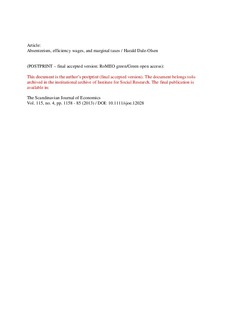| dc.contributor.author | Dale-Olsen, Harald | |
| dc.date.accessioned | 2017-10-23T12:29:20Z | |
| dc.date.available | 2017-10-23T12:29:20Z | |
| dc.date.created | 2013-10-18T12:36:20Z | |
| dc.date.issued | 2013 | |
| dc.identifier.citation | The Scandinavian Journal of Economics. 2013, 115 (4), 1158-1185. | |
| dc.identifier.issn | 0347-0520 | |
| dc.identifier.uri | http://hdl.handle.net/11250/2461473 | |
| dc.description.abstract | In this paper, I test the argument that increased taxes on earnings correspond to increased incentives to shirk, thus causing an increase in the rate of worker absenteeism. After fixed job effects are taken into account, panel register data on prime-age Norwegian males who work full-time show that a higher marginal net-of-earnings-tax rate reduces the rate of absenteeism. When the net-of-tax rate is increased by 1.0 percent, absenteeism decreases by 0.3−0.5 percent. Injury-related absences are less affected by tax changes than other absences. Absenteeism becomes more sensitive to tax changes as the occupational unemployment rate increases. | |
| dc.language.iso | eng | |
| dc.title | Absenteeism, efficiency wages, and marginal taxes | |
| dc.type | Peer reviewed | |
| dc.type | Journal article | |
| dc.description.version | acceptedVersion | |
| dc.source.pagenumber | 1158-1185 | |
| dc.source.volume | 115 | |
| dc.source.journal | The Scandinavian Journal of Economics | |
| dc.source.issue | 4 | |
| dc.identifier.doi | 10.1111/sjoe.12028 | |
| dc.identifier.cristin | 1058718 | |
| dc.relation.project | Norges forskningsråd: 187928 | |
| cristin.unitcode | 7437,0,0,0 | |
| cristin.unitname | Institutt for samfunnsforskning | |
| cristin.ispublished | true | |
| cristin.fulltext | postprint | |
| cristin.fulltext | | |
| cristin.qualitycode | 2 | |
